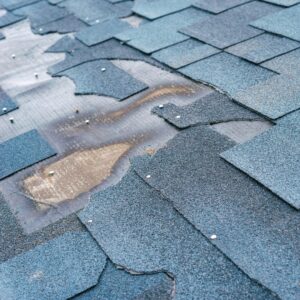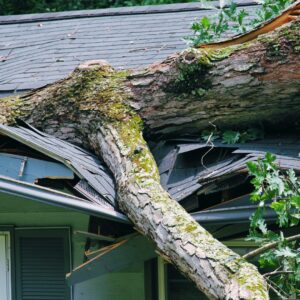Your roof is one of the hardest-working parts of your home. From blistering summer heat to icy winter storms, Kansas City roofs endure all four seasons, and often all four in a single week. Knowing when it’s time to replace your roof can save you thousands of dollars in repairs, prevent costly water damage, and protect the long-term value of your home.
In this guide, we’ll cover average roof lifespans in the Midwest, the unique impact of Missouri’s weather, signs of roof failure you should never ignore, and when to call a Kansas City roofing professional for help.

Average Roof Lifespans in the Midwest
The type of roofing material on your home is the first clue to estimating replacement timing. In Kansas City and across the Midwest:
- Asphalt shingles – The most common choice for local homes, asphalt shingles last 12–20 years depending on installation quality and exposure to weather
- Architectural asphalt shingles – Thicker and more durable than basic 3-tab shingles, these can stretch closer to 25–30 years
- Metal roofs – Known for their strength, metal roofing can last 40–70 years, making it an excellent long-term investment
- Wood shakes and shingles – Provide natural charm but usually last 20–25 years in the Midwest, where humidity and precipitation shorten their lifespan
- Clay or concrete tile – Rare in Kansas City but long-lasting, often surviving 50+ years when the roof structure is strong enough to support them
- Slate – The gold standard for durability, slate roofs can reach 75–100 years, but their high cost and weight make them uncommon
While these ranges provide a general benchmark, Kansas City’s weather accelerates wear and tear, meaning you may need replacement earlier than the numbers suggest.

How Missouri Weather Impacts Your Roof
Kansas City homeowners know how unpredictable Midwest weather can be. Unfortunately, those extremes are hard on your roof:
- Temperature swings – Missouri’s dramatic freeze-thaw cycles cause materials to expand and contract, creating cracks, loosening fasteners, and shortening a roof’s lifespan by as much as 20%
- Hailstorms – Common in spring and summer, hail larger than 1 inch can dent shingles, strip away protective granules, or puncture roofing materials, leading to leaks
- Heavy snow and ice – Ice dams form when melting snow refreezes at the roof’s edge, forcing water beneath shingles and into your home
- High winds – Gusts rip shingles away, loosen flashing, and allow wind-driven rain to infiltrate vulnerable areas
Because of these challenges, many Kansas City roofing experts recommend annual inspections, ideally in spring and after major storms, to catch early damage before it leads to costly repairs.

7 Signs It’s Time to Replace Your Roof
Even if your roof hasn’t reached the end of its expected lifespan, certain warning signs mean replacement may be around the corner:
- Curling or cracked shingles – Indicates advanced aging and a loss of weather resistance
- Bald spots and granule loss – Granules protect shingles from UV damage; when they wash into your gutters, shingles deteriorate faster
- Frequent leaks or water stains – Stains on ceilings or attic leaks mean your roof is no longer watertight
- Sagging roof deck – A serious structural issue often caused by prolonged water infiltration
- Moss or algae growth – While not always structurally harmful, moss traps moisture and accelerates shingle decay
- Dark streaks – Often caused by airborne algae, these streaks are unsightly and may indicate moisture retention
- Neighborhood replacements – If nearby homes built the same year as yours are getting new roofs, yours may be due as well
Delaying replacement after these signs appear can lead to structural rot, mold growth, and skyrocketing repair bills.

Storm Damage: Why Kansas City Homeowners Should Act Fast
Kansas City sits in the heart of “hail alley,” and storm-related damage is one of the leading causes of premature roof replacement. After a severe storm, inspect your home using the I.O.U. method recommended by GAF Roofing
- Inside – Check your attic for sunlight shining through boards, sagging wood, or water stains.
- Outside – Walk the perimeter of your home and look for missing shingles, bent flashing, or roof debris.
- Up the ladder – If safe, inspect for loose nails, cracked shingles, or clogged gutters.
Even if damage seems minor, insurance claims may only be honored if reported quickly. Waiting too long risks both worsening damage and reduced coverage.

When Repairs Aren’t Enough
Not every roof problem requires a full replacement. Small leaks, missing shingles, or minor flashing issues can often be repaired. But replacement is the smarter choice when:
- Repairs are frequent and costly.
- Your roof is older than 15–20 years and showing multiple problem areas
- Weather damage has compromised large sections.
- Energy bills are rising due to poor insulation from aging materials
At some point, continued patching becomes more expensive than investing in a new, weather-resistant roof.

Protecting Your Investment
Replacing your roof is a major project, but it also offers long-term benefits:
- Energy efficiency – Modern shingles and metal roofing improve insulation and reflectivity, lowering energy bills
- Resale value – A new roof boosts curb appeal and makes your home more attractive to Kansas City buyers.
- Peace of mind – Instead of worrying about every storm, you can feel confident your roof will withstand the elements.
For maximum value, choose impact-resistant shingles or metal roofing designed for Midwest weather. These materials not only last longer but may also qualify for insurance discounts.

Final Thoughts
Kansas City’s climate is tough on roofs. Between hail, high winds, heavy snow, and rapid temperature swings, it’s no wonder many local homeowners face replacement sooner than expected.
By understanding average roof lifespans, recognizing early warning signs, and scheduling professional inspections, you can plan ahead and protect your home. Whether your roof is 12 years old and showing leaks, or 25 years old and simply worn out, replacing it before major damage occurs is always the smarter investment.
If you suspect it’s time for a new roof, reach out to a trusted Kansas City roofing contractor for a professional inspection. A strong, weather-resistant roof not only protects your home but also ensures your family’s safety and comfort for years to come.



